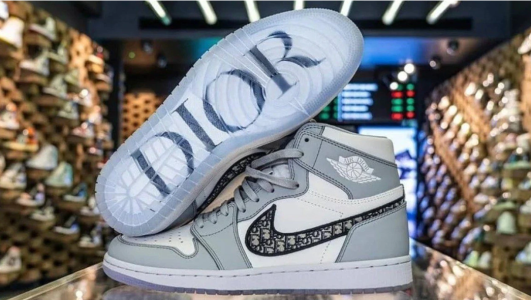Real Estate Agent out $30,000 from shocking shoe ‘scam’
By
- Replies 22
In a shocking turn of events, a Melbourne real estate agent found himself $30,000 out of pocket after falling victim to a sneaker ‘scam’.
The agent, who had purchased what he believed to be authentic, limited-edition sneakers, was also denied a refund due to a peculiar reason.
The Sneaker ‘Scam’ Unveiled
The real estate agent, whose identity remains undisclosed, purchased several pairs of sneakers from the teenage reseller, believing them to be genuine Dior x Air Jordan 1 sneakers.
This particular model, released in 2020, was a limited-edition collaboration between the two brands, with only 8500 low-top shoes and 4700 high-top shoes produced.
Each pair was individually numbered and sold via a raffle system, allowing only one pair per customer.
The teenage reseller claimed to have a network of international associates who entered raffles on his behalf and sent the sneakers to him but was later chased and threatened by disgruntled customers over his business dealings.
The real estate agent, convinced by this claim, purchased four pairs of limited-edition sneakers for prices ranging from $3,800 to $10,000.
He also bought three pairs of Air Jordan 1 in the Bred, Chicago, and Royal colour schemes for $2,690 each.
However, upon receiving the sneakers, the agent noticed defects that led him to believe they were counterfeit.
Unable to reach the teen, he contacted the boy's father, and together, they took the sneakers to a Melbourne sneaker store for authentication.
The store's authenticator confirmed that all the sneakers were indeed counterfeit.
The real estate agent took the matter to the Victorian Civil and Administrative Tribunal (VCAT) in October, seeking a refund for his hefty purchase.
However, in a surprising twist, VCAT member Katherine Metcalf ruled in December that the agent was not entitled to a refund. The reason? The agreement was made with a minor who did not have full capacity to enter into contracts.
‘The contract was fully performed while [the seller] was a minor,’ Ms Metcalf wrote in her reasons.
‘Had the agreement been entered into when [the seller] was 18 years old the result might have been different.’
‘While the law generally protects minors from the consequences of their own actions, it could be argued that in the present circumstances it is not the minor who needs protection, but rather the people with whom he chose to do business.’
How to Avoid Falling Victim to a Scam
This case underscores the importance of due diligence when making high-value purchases, especially from private sellers.
It's crucial to verify the authenticity of the product and the seller's credibility before parting with your hard-earned money.
To avoid falling victim to similar scams, consider the following tips:
1. Verify the Seller: Conduct a background check on the seller. Look for reviews or feedback from previous buyers. If the seller is a minor, be aware that they may not be legally capable of entering into a contract.
2. Authenticate the Product: If you're buying a high-value item, especially a limited-edition product, ensure it's authenticated by a reputable source. In this case, the real estate agent only discovered the sneakers were fake after purchasing them.
3. Be Wary of Too-Good-to-Be-True Deals: If a deal seems too good to be true, it probably is. The real estate agent was convinced by the teen's claim of having a network of international associates who could secure limited-edition sneakers. This should have raised a red flag.
4. Seek Legal Advice: If you're unsure about a purchase, especially a high-value one, seek legal advice. A lawyer can help you understand the terms of the agreement and your rights as a buyer.
If you want help and advice for a scam-related incident, kindly inform your local authorities or visit Scamwatch Australia and report here.

The sneaker ‘scam’ case is a cautionary tale for all consumers. It's a stark reminder to always exercise due diligence when purchasing, especially from private sellers.
While the allure of limited-edition items can be strong, it's crucial to ensure you're not duped into buying counterfeit products.
What do you think of this story? Have you had experiences like this? Share with us in the comments below!
The agent, who had purchased what he believed to be authentic, limited-edition sneakers, was also denied a refund due to a peculiar reason.
The Sneaker ‘Scam’ Unveiled
The real estate agent, whose identity remains undisclosed, purchased several pairs of sneakers from the teenage reseller, believing them to be genuine Dior x Air Jordan 1 sneakers.
This particular model, released in 2020, was a limited-edition collaboration between the two brands, with only 8500 low-top shoes and 4700 high-top shoes produced.
Each pair was individually numbered and sold via a raffle system, allowing only one pair per customer.
The teenage reseller claimed to have a network of international associates who entered raffles on his behalf and sent the sneakers to him but was later chased and threatened by disgruntled customers over his business dealings.
The real estate agent, convinced by this claim, purchased four pairs of limited-edition sneakers for prices ranging from $3,800 to $10,000.
He also bought three pairs of Air Jordan 1 in the Bred, Chicago, and Royal colour schemes for $2,690 each.
However, upon receiving the sneakers, the agent noticed defects that led him to believe they were counterfeit.
Unable to reach the teen, he contacted the boy's father, and together, they took the sneakers to a Melbourne sneaker store for authentication.
The store's authenticator confirmed that all the sneakers were indeed counterfeit.
The real estate agent took the matter to the Victorian Civil and Administrative Tribunal (VCAT) in October, seeking a refund for his hefty purchase.
However, in a surprising twist, VCAT member Katherine Metcalf ruled in December that the agent was not entitled to a refund. The reason? The agreement was made with a minor who did not have full capacity to enter into contracts.
‘The contract was fully performed while [the seller] was a minor,’ Ms Metcalf wrote in her reasons.
‘Had the agreement been entered into when [the seller] was 18 years old the result might have been different.’
‘While the law generally protects minors from the consequences of their own actions, it could be argued that in the present circumstances it is not the minor who needs protection, but rather the people with whom he chose to do business.’
How to Avoid Falling Victim to a Scam
This case underscores the importance of due diligence when making high-value purchases, especially from private sellers.
It's crucial to verify the authenticity of the product and the seller's credibility before parting with your hard-earned money.
To avoid falling victim to similar scams, consider the following tips:
1. Verify the Seller: Conduct a background check on the seller. Look for reviews or feedback from previous buyers. If the seller is a minor, be aware that they may not be legally capable of entering into a contract.
2. Authenticate the Product: If you're buying a high-value item, especially a limited-edition product, ensure it's authenticated by a reputable source. In this case, the real estate agent only discovered the sneakers were fake after purchasing them.
3. Be Wary of Too-Good-to-Be-True Deals: If a deal seems too good to be true, it probably is. The real estate agent was convinced by the teen's claim of having a network of international associates who could secure limited-edition sneakers. This should have raised a red flag.
4. Seek Legal Advice: If you're unsure about a purchase, especially a high-value one, seek legal advice. A lawyer can help you understand the terms of the agreement and your rights as a buyer.
If you want help and advice for a scam-related incident, kindly inform your local authorities or visit Scamwatch Australia and report here.
Key Takeaways
- A Melbourne real estate agent spent $30,000 on sneakers he believed to be counterfeit and was denied a refund due to the age of the seller.
- The sneakers were part of a limited Dior x Air Jordan collaboration, sold through a raffle system to limit purchases to one pair per customer.
- Victorian Civil and Administrative Tribunal ruled that the buyer was not entitled to a refund as the contract was with a minor, who did not have full capacity to enter into contracts.
- The teen sneaker reseller claimed to have a system for obtaining the shoes through international associates, but was later chased and threatened by disgruntled customers over his business dealings.
The sneaker ‘scam’ case is a cautionary tale for all consumers. It's a stark reminder to always exercise due diligence when purchasing, especially from private sellers.
While the allure of limited-edition items can be strong, it's crucial to ensure you're not duped into buying counterfeit products.
What do you think of this story? Have you had experiences like this? Share with us in the comments below!








